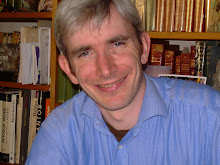
A couple of days ago I mentioned a meeting to discuss changing the country's name. The reasons for this are worth telling. The whole thing hinges on a paragraph in Michael Gibson's introduction to The Riddle of the Seal:
"In ages past", he writes, "the inhabitants of its countless provinces, towns, villages and hamlets, had no single name for the land. The present name only entered common usage after the first of the great Navigators reached its shores five hundred years ago and asked the first man they chanced upon what land this might be. He promptly replied: “Go’ndwa-ná,” and so it was set down on their maps. Only later, when scholars reached the land and began to study some of its many languages, did it appear that “Go’ndwa-ná!” actually meant: 'I’m sorry! I don’t understand'!”
The first suggestion for a change of name came a few years ago, shortly after I addressed the UN. I happened upon delegates of various countries (including Beluchistan, Pakistan, Afghanistan - and several other "stans"),and one of them, a notorious wit, suggested, with a perfectly straight face, that the country's be changed to Yaydon-Unnastan."
We all laughed and dropped the subject. I very much doubt that such an initiative can actually achieve anything more than add to the confusion, but since some delegates began discussing the proposal seriously when they came across me in the hallway, pointing out that their own countries had changed names after the departure of the colonial powers, I thought we'd better have a meeting that would lay the matter to rest. And, as we all know, the best way to do this without hurting anyone's feelings is to appoint a committee to examine the question.
And so, since Herbert and Wilhelmina both had business in Europe at that time, they agreed to attend this meeting as experts, play along with the idea as long as necessary to help me shelve the project.
I'd talked all this over at a cabinet meeting at home, and shortly thereafter, dear Angelo who, as you know, is a poet, urged me to stand fast and, handing me a translation he'd recently made of a short poem by Francis Jammes, added these enigmatic words: "Once we realize that we don't understand, we've made a decisive step in the right direction, don't you think?"
Here's what he gave me:
When I am dead, you, with blue eyes
The color of tiny fireblue water-beetles,
Young girl whom I dearly loved,
And who are like an iris in The Animated Flowers,
You'll come and take me gently by the hand.
You'll lead me down this little hidden path.
You won't be naked, no, but, O my dear, sweet rose!
Your mild breast will blossom within your blouse of mauve.
We won't even kiss one another on the forehead
But, hand in hand, skirting the new-green brambles
Where the grey spiders sit and weave their rainbows,
We'll shape a silence soft as honey.
And now and then, when you sense my sadness rising,
You'll press your slender fingers harder on my hand
And together, stirred like lilacs in a thunderstorm,
We won't understand... we won't understand.
The Animated Flowers, by the way; was a French publication of the nineteenth century, which had apparently caught the poet's fancy. I looked it up and couldn't find the iris, but I did find another flower (posted above), which gives an idea of the sort of beauty that enchanted the French poet.
The color of tiny fireblue water-beetles,
Young girl whom I dearly loved,
And who are like an iris in The Animated Flowers,
You'll come and take me gently by the hand.
You'll lead me down this little hidden path.
You won't be naked, no, but, O my dear, sweet rose!
Your mild breast will blossom within your blouse of mauve.
We won't even kiss one another on the forehead
But, hand in hand, skirting the new-green brambles
Where the grey spiders sit and weave their rainbows,
We'll shape a silence soft as honey.
And now and then, when you sense my sadness rising,
You'll press your slender fingers harder on my hand
And together, stirred like lilacs in a thunderstorm,
We won't understand... we won't understand.
The Animated Flowers, by the way; was a French publication of the nineteenth century, which had apparently caught the poet's fancy. I looked it up and couldn't find the iris, but I did find another flower (posted above), which gives an idea of the sort of beauty that enchanted the French poet.
Not really my style, but tastes do change!

No comments:
Post a Comment